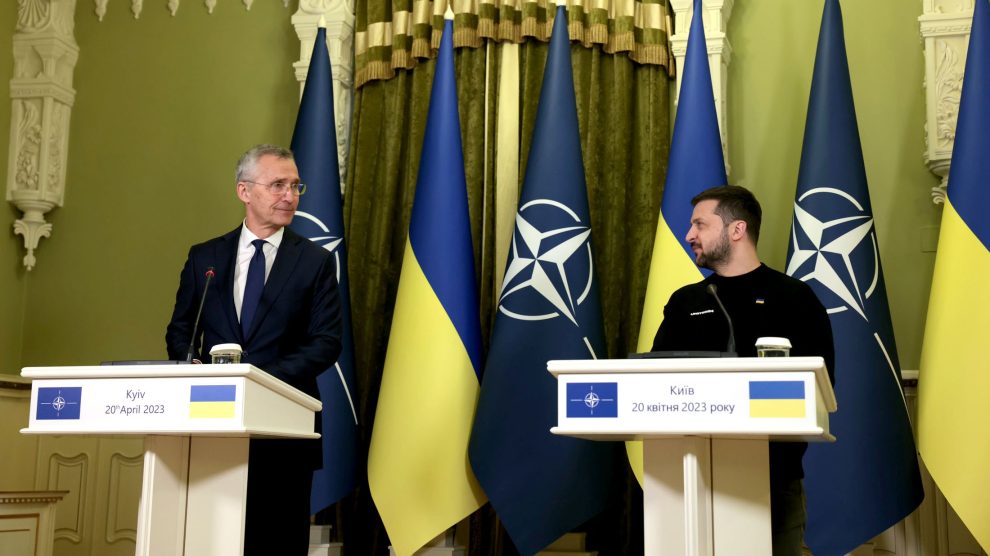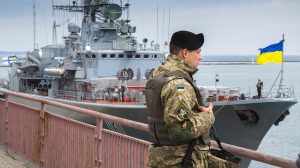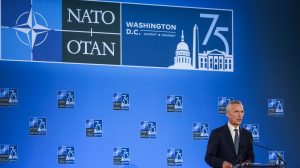You can read all of our coverage of Russia’s invasion of Ukraine, including explainers and articles offering context and background information here.
Russia’s invasion of Ukraine
NATO Secretary General Jens Stoltenberg on Thursday paid his first visit to Kyiv since Russia’s full-scale invasion, in a show of support for Ukraine as it prepares to launch a counteroffensive.
Stoltenberg paid his respects to Ukrainian soldiers who have been killed fighting in the war and reviewed damaged Russian military equipment displayed on a central square in Kyiv.
At a joint press conference with Ukrainian President Volodymyr Zelensky, Stoltenberg said Ukraine’s rightful place was in the North Atlantic Treaty Organisation.
“Ukraine’s future is in the Euro-Atlantic family, Ukraine’s future is in NATO, all allies agree on that,” Stoltenberg said. He said “the issue of membership” will be “high on the agenda” at a NATO summit in Vilnius in July.
Zelensky said he believed the summit could become “historic” and that he had been invited to attend.
“There is no objective barrier to the political decision to invite Ukraine into the alliance and now, when most people in NATO countries and the majority of Ukrainians support NATO accession, is the time for the corresponding decisions,” said Zelensky.
Poland agreed on Tuesday to lift a ban on the transit of Ukrainian grain and food products, but Ukraine said a wartime deal allowing it to safely ship grain from Black Sea ports was still under threat.
Failure to resume exports into eastern European countries or secure an extension of the Black Sea grain deal would trap large amounts of grain in Ukraine, hitting its exports and causing further economic problems for Kyiv as it battles Russian troops.
European Union member states Poland, Hungary and Slovakia have imposed import bans to protect their markets from an influx of cheaper supply following the Russian invasion of Ukraine, and Warsaw banned their transit through Poland at the weekend.
A former Wagner mercenary this week admitted to killing and torturing dozens of Ukrainian prisoners of war, in one of the most detailed first-person accounts of atrocities committed by Russian forces in Ukraine.
Alexey Savichev, 49, a former Russian convict recruited by Wagner last September, told the Guardian in a telephone interview that he participated in summary executions of Ukrainian prisoners of war during his six months of fighting in eastern Ukraine.
“We were told not to take any prisoners, and just shoot them on the spot,” he said.
In one instance, while fighting near the eastern Ukrainian city of Soledar last autumn, Savichev said he participated in the killings of 20 Ukrainian soldiers who were surrounded. “We sprayed them with our bullets,” he said. “It is war and I do not regret a single thing I did there. If I could, I would go back.”
Another former Wagner fighter, identified as Azamat Uldarov, said he had killed civilians, including children, during the battle for Bakhmut.
The US has sensitive nuclear technology at a nuclear power plant inside Ukraine and is warning Russia not to touch it, according to a letter the US Department of Energy sent to Russia’s state-owned nuclear energy firm Rosatom last month.
In the letter, which was reviewed by CNN and is dated March 17, 2023, the director of the Energy Department’s Office of Nonproliferation Policy, Andrea Ferkile, tells Rosatom’s director general that the Zaporizhzhia Nuclear Power Plant in Enerhodar “contains US-origin nuclear technical data that is export-controlled by the United States Government.”
Goods, software and technology are subject to US export controls when it is possible for them to be used in a way that undermines US national security interests.
The Energy Department letter comes as Russian forces continue to control the plant, which is the largest nuclear power station in Europe and sits in a part of the Zaporizhzhia region that Russia occupied after its invasion of Ukraine last February. The plant has frequently been disconnected from Ukraine’s power grid due to intense Russian shelling in the area, raising fears across Europe of a nuclear accident.
Associated Press photographer Evgeniy Maloletka won the World Press Photo of the Year on Thursday for his harrowing image of emergency workers carrying a pregnant woman through the shattered grounds of a maternity hospital in the Ukrainian city of Mariupol, in the chaotic aftermath of a Russian attack.
The Ukrainian photographer’s March 9, 2022, image of the fatally wounded woman, her left hand on her bloodied lower left abdomen, drove home the horror of Russia’s brutal onslaught in the eastern port city early in the war.
The 32-year-old woman, Iryna Kalinina, died of her injuries a half hour after giving birth to the lifeless body of her baby named Miron.

Other news from the region
Kosovo citizens will be able travel freely to the EU’s passport-free Schengen zone by the start of 2024 after European Parliament members approved the removal of the visa regime on Tuesday. The exemption from visa requirements will apply from the start date for the operation of the new European Travel Information and Authorisation System, ETIAS, a travel authorisation system for non-EU nationals which is expected to come into force by November 1 this year or no later than January 1, 2024.
Armenia’s prime minister has given the strongest signal yet that he is prepared to acknowledge Azerbaijan’s sovereignty over the disputed Nagorno-Karabakh region, while urging the EU and Russia to help prevent a catastrophic new conflict in the South Caucasus. Speaking in parliament Tuesday, Nikol Pashinyan said his government “reaffirmed that the Republic of Armenia fully recognises the territorial integrity of Azerbaijan” and called for a peace treaty to be signed with the neighboring nation “without ambiguities and pitfalls.” In return, he said, Baku should recognise Armenia’s territory within its Soviet-era borders.
A fugitive Moldovan oligarch and opposition party leader was sentenced in absentia last Thursday to 15 years in jail for his role in a one-billion-dollar bank theft case. Ilan Shor, who leads the populist Russia-friendly Shor party, was convicted of fraud and money laundering in the case of one billion US dollars that went missing from Moldovan banks in 2014. Shor fled Moldova in 2019 to evade corruption charges and has since been living in exile in Israel, where he was born.
Poland has begun building a state-of-the-art electronic barrier at its land border with Russia’s Kaliningrad exclave to monitor and counteract any illegal activity, the Polish interior minister said Tuesday. The barrier, which will be equipped with 24-hour monitoring cameras and motion detectors, will run for 209 kilometres and is due to be completed in the autumn. “We will have full monitoring of the border with Russia,” Mariusz Kaminski told a news conference. “I am sure that this will be the best secured EU border,” he said.
Hungary unexpectedly signalled its first potential step toward cutting the European Union’s highest key interest rate this week, with policymakers pointing to an outlook of rapidly slowing inflation. Central bank Deputy Governor Barnabas Virag caught investors by surprise after months of pushing back against government pressure to lower the 18 per cent key interest rate to aid the recession-hit economy. Central bankers had until now cited inflation of above 25 per cent — also the highest in the EU — and a wobbly currency as key obstacles to looser policy.
The European Commission this week announced that it has decided to open an in-depth investigation under the state aid rules to assess certain Romanian support measures for airline Blue Air. The airline has not flown since November 2022 when the Romanian authorities suspended temporarily its operating license due to its financial situation. In August 2020, the Commission approved a 28 million euros Romanian public guarantee to compensate Blue Air for damage resulting from the coronavirus pandemic and a 34 million euros public guarantee on a rescue loan.
Estonia’s state prosecutor said on Monday she had charged six people with laundering at least 1.6 billion US dollars and six million euros ($6.58 million) at the now-defunct Estonian office of Danske Bank, Denmark’s largest lender. The operations in Estonia became the focus of a massive money laundering scandal after it was discovered some 200 billion euros in suspicious payments flowed through the non-resident portfolio of the tiny branch between 2007 and 2015.
Authorities in the North Kazakhstan region said on Tuesday that three members of a group called the People’s Council in the regional capital, Petropavl, have been arrested on separatism charges and face up to seven years in prison if convicted. The group announced its creation in March, saying it promotes “our independence and sovereignty” and “the unbreakable territorial integrity of the sovereign Kazakh Soviet Socialist Republic”, Kazakhstan’s former name when it was part of the Soviet Union.
Seven people were arrested in Poland this week over the death of a British tourist who was forced to drink 22 shots in just 90 minutes during a visit to a Polish strip club. Mark Cocks, 36, died of alcohol poisoning in 2017 after being plied with scores of shots at the Wild Night club in Kraków. Now Polish cops have arrested those they think were part of an organised crime gang behind a series of deaths of foreigners who were allegedly drugged and robbed at the notorious club.
Photo: NATO.
Unlike many news and information platforms, Emerging Europe is free to read, and always will be. There is no paywall here. We are independent, not affiliated with nor representing any political party or business organisation. We want the very best for emerging Europe, nothing more, nothing less. Your support will help us continue to spread the word about this amazing region.
You can contribute here. Thank you.







Add Comment